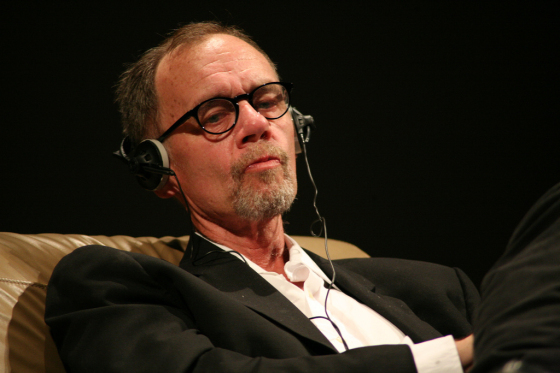In his autobiography “Me and My girls,” Carr details his previous struggles with drug addiction and single parenthood. (Photo courtesy of Flickr)
Twenty minutes into “Page One: Inside the New York Times,” a documentary that was released last year about the newspaper, one thing becomes strikingly clear: David Carr is not your typical Timesman.
The first time the audience sees Carr on assignment in the movie, he is interviewing the founders of Vice magazine. The “unlikely” partnership of CNN and the youth-centered, quirky magazine was the subjects of Carr’s weekly column for the Times.
“I don’t do corporate portraitures,” Carr said as he quickly simplified the spiraling question. “What the f— is going on that you’re doing business with CNN?”
Soon the discussion turned toward “The Vice Guide to Liberia” as Shane Smith, CEO and cofounder of Vice, compared the Times’ surfing coverage to the reports on cannibalism Vice produced. In turn, he opened himself up to an ugly episode of open fire.
“Before you ever went there, we’ve had reporters there reporting on genocide after genocide and just ‘cause you put on a f—ing safari helmet and looked at some poop [referring to the beaches in West Africa that have become breeding grounds for human excrement], doesn’t give you the right to insult what we do,” Carr said straight-faced to an apologetic Smith.
Carr is consistently present throughout the 92-minute documentary, directed by Andrew Rossi, as the film dedicates itself to assessing the rocky ground of journalism through the sharp sense of the Times’ Media Desk. It is Carr’s quick wit and protective nature over the Times that steal the spotlight.
On the surface, Carr is simply another ink-producer, a journalist with an agenda. But a few columns, YouTube videos and tweets later, any passive reader could easily gather that Carr is, himself, a story worthy of redemption.
In July 2008, Carr published “Me and MY Girls,” a revealing article that chronicled the history of a drug-addicted, single parent of twins on welfare — his own past.
“Having suffered through drug addiction in the 20s and 30s, landing in jail for cocaine possession, raising two children as a single parent and eventually ending up at The New York Times, I know what it’s like to come out on the other side when the odds are stacked up against you,” Carr said in the documentary.
And while his “textured” background of drugs seems to be far behind him, the good of what has, most likely, always been inside of David Carr consistently seeps onto the page through his honest language and the relentlessness of his reporting. He fights for the interviews that matter, defends the Times against attacks from slick 20-somethings who bash mainstream media, and seeks to serve his reader the simple truth.
Carr does not write to rack up Google hits or collect digital “followers,” but instead remains grounded to the fundamental pillars upon which journalism was founded: to inform the reader in a spirit of genuine benefit through fair reporting — whatever that may entail. He is part of a dying breed among today’s fast-paced, tumultuous media industry.
“I arrived at The New York Times late in my professional life and I have an immigrant’s love of the place,” Carr said in the documentary. “ The chip that was implanted in me when I arrived, let’s call it New York Times exceptionalism, leads me to conclude that of course, we will survive.”





